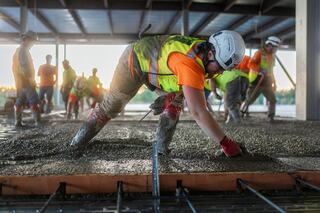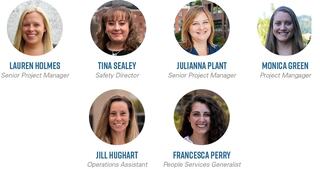The Future is Bright for Women in Construction

This week is Women in Construction Week, a national celebration of the growing number of women joining the construction industry, from carpenter apprentice to project manager and beyond.
Members of Lewis’ Women’s Development Group held a discussion about their experiences in the industry, their hopes for the future and the importance of representation as more and more women choose a career path in construction.
Throughout the pandemic, Lewis employees have become more and more connected via virtual means—in person meetings have moved to video calls or virtual chats. With that in mind, the Women’s Development Group posed several questions to its’ members via Teams to inspire discussions and connect our female employees across the region. Today, you will get an inside look into those conversations in celebration of Women in Construction week.
This week is Women in Construction Week, a national celebration of the growing number of women joining the construction industry, from carpenter apprentice to project manager and beyond.
Members of Lewis’ Women’s Development Group held a discussion about their experiences in the industry, their hopes for the future and the importance of representation as more and more women choose a career path in construction.
Throughout the pandemic, Lewis employees have become more and more connected via virtual means—in person meetings have moved to video calls or virtual chats. With that in mind, the Women’s Development Group posed several questions to its’ members via Teams to inspire discussions and connect our female employees across the region. Today, you will get an inside look into those conversations in celebration of Women in Construction week.

Lewis’ theme for Women in Construction Week is “the future is bright.” What do you predict will be the future of the construction industry? What are you doing to help make that happen?
Julianna Plant, Senior Project Manager: I see the industry moving towards a more inclusive space where we tap into individuals’ specific skills and background to find solutions to each unique built environment we create. I see architects, engineers, manufacturers and craft workers coming together to find solutions to challenges that we face to make a vision a reality. I am excited to see “shop class” coming back into our high schools and a push for students to have alternative pathways to a career.
“It is important for women to see women in roles that they can strive to be in one day.”
— Lauren Holmes
Lauren Holmes, Senior Project Manager: My dream is to see women continue to enter the industry, and to see women in leadership positions. It is important for women in see women in roles that they can strive to be in one day. I am going to continue to recruit at local universities and provide mentorship to women looking to enter the industry and those that are in the industry.
Tina Sealey, Safety Director: Joining construction was not particularly natural for me because I started with a structural steel company that was predominately male. But I was given lots of opportunities and mentorship because people saw a future for me! Some companies are better at making women feel included, starting at the top. It is really important to have representation and make programs, promotions and training available to women.
As more and more women consider careers in construction, what should they know?
Lauren Holmes, Senior Project Manager: I have found that sometimes my voice is not heard at the same volume when I am in a room full of men. It can be frustrating, but it is important to be confident, and use your voice to make sure you are heard. Men and women problem solve differently, so making sure you are heard in the moment is important. I also think you need to have tough skin. You need to know that you are entering a world where you are a minority, and that is okay, but you should be prepared because the road might be a little bit harder. It is important to remember not to take things personally and to try to remember where people are coming from first.
Jill Hughart, Operations Assistant: Keep your head up and eyes on the prize. This is a career that you’ve chosen, and it is yours. Know your stuff and own it. No one can or should derail you from pursuing what you love to do. Thick skin, tender heart.
As a minority in this industry, you probably have experienced a challenge that your male peers may not experience. How do you overcome those challenges? What did you learn and what would you do next time?
Lauren Holmes, Senior Project Manager: When I started, people automatically assumed I was a receptionist and that I didn’t know the answer to their questions. I think as more women have joined the industry this behavior has changed, and people have realized that women can hold field operations roles as well as any man!
“Any time I get the chance, I always advocate to our leaders about how great my female peers are. In my experience, women don't gloat, so we need to do it for each other.”
— Monica Green
Monica Green, Project Manager: I agree @Lauren Holmes. I’ve had situations where a subcontractor wanted to work directly with a male superintendent or where people assume that I am a receptionist because I am a woman. Unfortunately, there are just some people out there that haven’t come around to women in leadership roles in construction, but they are becoming fewer each day. I think having thick skin, standing up for yourself and not allowing people like that affect your strengths and abilities are important. It is only a matter of time until women will hold equal management roles to their male counterparts. Any time I get the chance, I always advocate to our leaders about how great my female peers are. In my experience, women don’t gloat, so we need to do it for each other!
Julianna Plant, Senior Project Manager: I have also experienced that same thing in the job office and during a training session. The instructor didn’t think I was a project manager who would be approving pay applications. The more we can be out in public and show that women are thriving in construction, the less it will be a surprise! Hosting jobsite tours for students, speaking at a career day or participating in community events are some ways to change the perception.
As more women join the industry, they are proving that they are a natural in construction. What about your job feels easy or natural to you?
Lauren Holmes, Senior Project Manager: I have found that the communication styles between men and women are usually quite different, and I use that to my advantage. In my experience, women tend to be less abrasive and threatening to our male counterparts. With that in mind, I approach the conversations with a calm, questioning perspective and it helps de-escalate tense situations.
Mentorship plays a major role in construction. Do you have a mentor? What have you learned from them? Or, do you have a mentee? What is important for them to learn in their career?
Francesca Perry, People Services Generalist: Sometimes you just need someone who can be your sounding board. My mentor has taught me that taking care (of) my mental health is most important. It allows you to bring your best self to work every day. She has also taught me to keep asking questions! It’s always better to clarify versus getting through a process or project and wishing you had.
“My advice is to sit at the table, be prepared, be present at meetings and ask questions.”
— Julianna Plant
Julianna Plant, Senior Project Manager: I have been fortunate to have some male allies along the way who encouraged me to speak up, asked for my input and made sure I had a seat at the meeting table. I became more confident of my place. I always contribute to the conversation and ask questions at meetings. My advice is to sit at the table, be prepared, be present at meetings and ask questions.
While in the past, a career in construction may have been considered a “non-traditional” career path, women across the industry are proving otherwise and blazing a path forward. There are talented female construction leaders at every level of construction, and we, as an industry, have a lot to learn from them. What has become clear is that representation and supporting women in this field play a key role in building an inclusive future for women in construction.
We hope that girls and women planning for their future can imagine themselves as carpenters, electricians, foremen, project managers and even CEOs. The future of construction holds boundless opportunities for women and is looking brighter everyday.
